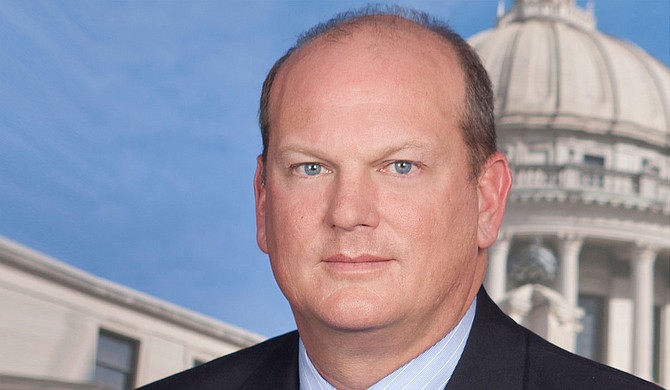Speaking on the Senate floor Tuesday, Sen. Brice Wiggins of Pascagoula said Mississippi is the second most incarcerated state in the nation, and it’s costly to house those inmates. Photo courtesy Mississippi Senate
JACKSON, Miss. (AP) — The Mississippi Legislature has passed a bill that could grant thousands of incarcerated inmates a chance at parole.
The Mississippi Correctional Safety and Rehabilitation Act of 2020, or SB 2123, was approved by the House and Senate on Tuesday after a couple of lawmakers raised concerns about the effect releasing prisoners could have on law enforcement.
If signed by Gov. Tate Reeves, the bill will allow people convicted of nonviolent offenses to be eligible for parole after serving 25% of their sentence or after 10 years, whichever comes first. People convicted of violent offenses would be eligible for parole after completing 50% of their sentence, or after 20 years, whichever comes first, for those sentenced between July 1, 1995, and June 30, 2014.
The bill will allow people convicted of most violent offenses after July 1, 2014, to become eligible for parole after serving 50% of their sentence served or after 30 years, whichever is less. The bill also allows geriatric parole hearings for those 65 and older who have served 10 years of their sentences.
The bill does not guarantee any inmate parole, only the opportunity to apply to the parole board. The parole board can deny any offender it feels could not be released safely in the community. Habitual offenders, sex offenders and inmates sentenced for capital murder would not be eligible for parole.
Speaking on the Senate floor Tuesday, Sen. Brice Wiggins of Pascagoula said Mississippi is the second most incarcerated state in the nation, and it’s costly to house those inmates. According to the Department of Corrections, 14,044 of the approximately 19,000 inmates in Mississippi prisons are serving at least one sentence that is not eligible for parole. Housing an inmate costs $14,500 a year in Mississippi, according to a 2019 report by FWD.us, which advocates for criminal justice reform.
“We have a significant problem, we are spending millions and millions of dollars, and this is about being smart and protecting public safety,” Wiggins said.
He cited recent issues with violence within the state Department of Corrections. In a single week at the end of last year, five inmates were killed in Mississippi. More than 30 have died in state custody this year. Giving more inmates the chance at parole would incentivize participation in educational and rehabilitative activities and hopefully reduce violence, Wiggins said.
On the other hand, Republican Sen. Chad McMahan of Guntown said that violence is exactly why sheriffs and police chiefs in the state have expressed concerns to him about the bill. He said offenders are arrested and incarcerated for a reason.
“We act like law enforcement is just putting people in jail just to keep the prisons full or overpopulated," he said.
Republican Sen. Angela Burks Hill of Picayune said law enforcement officers feel that every time the legislature passes another criminal justice reform, it's “a slap in their face.”
“They say we need to start protecting the communities and we need to stop rewarding people who break the law," she said. Hill said the bill does not take victims into consideration enough.
The bill allows victims to speak at offenders parole hearings and plead their case.
Democrat Sen. Juan Barnett of Heidelberg is a sponsor of the bill. He said he believes the bill does take victims into consideration. Barnett's father was a murder victim, but he does not believe in locking up" individuals and throwing away the key," he said.
“I refuse to let the fact that I lost my father to a violent crime stop me from advocating for individuals who have made a mistake," Barnett said.
If signed by the governor, SB 2123 would take effect immediately.
Copyright Associated Press. All rights reserved. This material may not be published, broadcast, rewritten, or redistributed.



Comments
Use the comment form below to begin a discussion about this content.
comments powered by Disqus